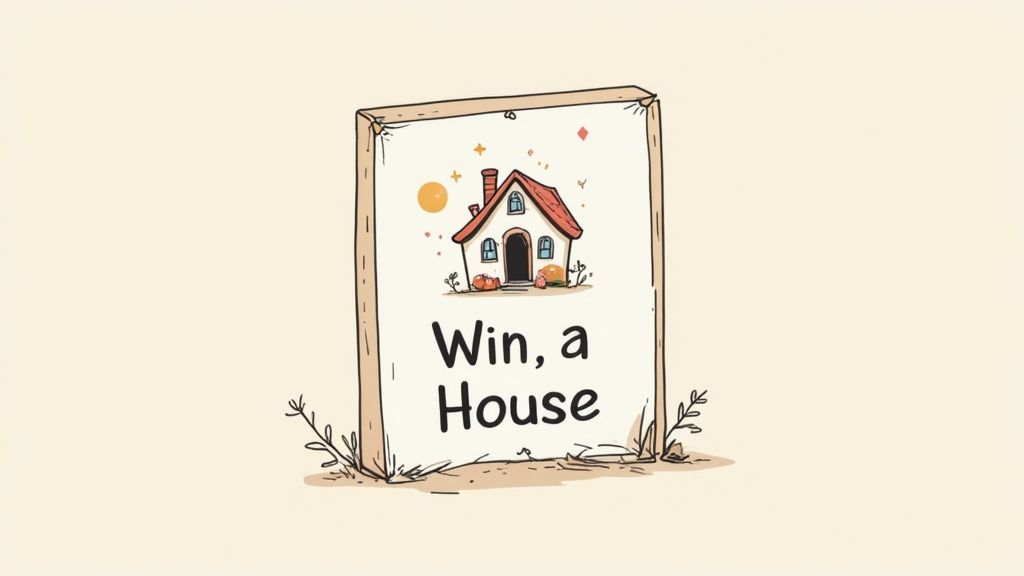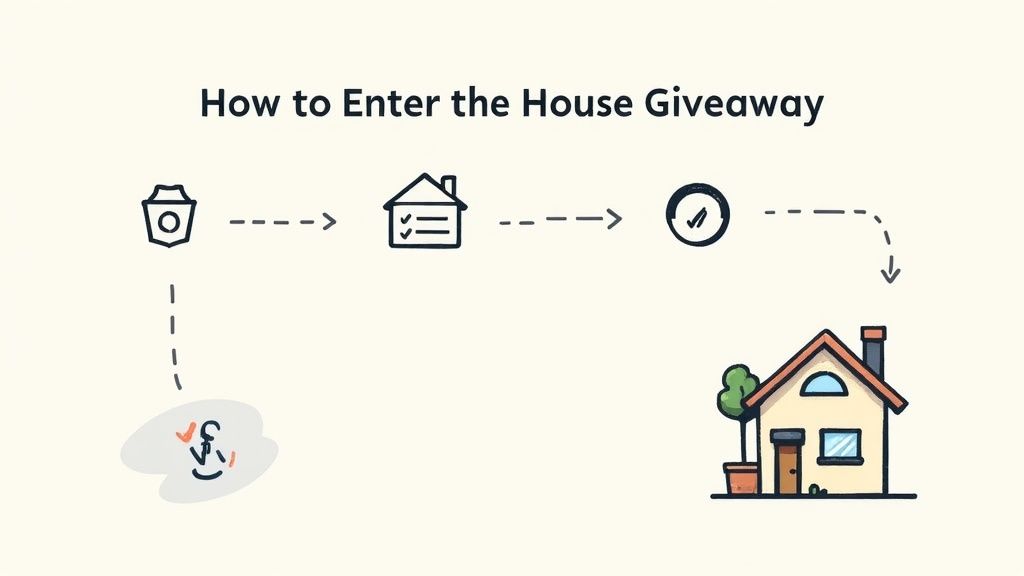The Property Competition Phenomenon Sweeping Britain

The British dream of homeownership feels further away than ever for many, especially in the current challenging property market. High deposits, rising house prices, and strict lending criteria present significant obstacles. That’s where the appeal of “win a house” competitions comes in, offering a tempting chance at a shortcut to owning a property. These competitions have rapidly grown from a niche marketing tactic into a widespread phenomenon.
This growing industry is making homeowners out of everyday people practically overnight. Platforms like Win A Country Home and Omaze are key players, showcasing desirable properties and attracting large numbers of hopeful entrants. The psychological draw is clear: the possibility, no matter how small, of skipping the traditional, often difficult process of buying a home is enticing. For a small fee, participants can dare to imagine owning a home they might not otherwise be able to afford.
However, the increasing popularity of these competitions also raises important questions. How exactly do these competitions function? Are they a legitimate path to homeownership, or just a gamble?
Understanding the Growth of UK Housing Raffles
Win a house competitions in the UK have seen significant expansion, particularly with platforms like Win A Country Home gaining traction during the 2020 lockdown. These competitions often involve the sale of hundreds of thousands of tickets, generating substantial revenue for the organizers. For example, in one competition, a couple sold almost 450,000 tickets at £2 each, resulting in a considerable profit after the house was sold. This business model is similar to a lottery, with the odds of winning being quite low. Even so, the dream of homeownership keeps people entering. Discover more insights about UK housing raffles.
Understanding the Allure of Property Competitions
The attraction of these competitions goes beyond simply winning a house. They connect with fundamental desires for financial security and a better life. For many, a home represents more than just a building; it’s a symbol of success and stability. This emotional connection fuels entries, despite the low odds.
Competition organizers also employ effective marketing to heighten the dream. Showcasing beautiful properties, featuring past winners, and emphasizing the life-changing potential of winning contribute to the competitions’ allure. The relatively low cost of entry compared to a typical house deposit also broadens the appeal. The next section will explore the details of how these competitions operate and the regulations that govern them.
Behind the Scenes: How Win a House Contests Really Work

Ever wondered about the inner workings of those enticing win a house competitions? They dangle the dream of homeownership for the price of a raffle ticket, but what’s the reality behind the marketing? Let’s pull back the curtain and explore the mechanics, legalities, and crucial decisions driving these increasingly popular contests.
Navigating the Legal Landscape
UK law differentiates between lotteries and prize competitions. Lotteries, purely chance-based, face strict regulations and licensing requirements. To avoid this, most win a house contests are structured as prize competitions. This is achieved by incorporating a skill-based element, typically a question you must answer correctly to enter. This seemingly minor detail plays a significant role in ensuring compliance with gambling laws.
The Price of a Dream: Entry Routes and Costs
While buying tickets is the most common entry method, a free postal entry route is usually available. This lesser-known option ensures legal compliance, though finding information about it might require some digging. Ticket prices typically range from a modest £1 up to £25. Understanding the various entry methods helps participants make informed decisions about their investment.
The Threshold for Awarding a House
The house’s fate often rests on ticket sales. A minimum ticket sales target is usually set, a pivotal threshold for awarding the property. If sales fall short, the winner often receives a cash prize instead, typically a percentage of the revenue. This crucial detail, often buried in the fine print, is vital for managing expectations. Reading the terms and conditions is paramount for any prospective participant. To further understand the different types of competitions and their odds, let’s examine the following table:
To help you understand the varying landscape of these competitions, we’ve compiled a table outlining the common types. This table compares different formats, entry requirements, and typical odds, allowing you to better grasp the nuances of each.
Common Types of Win a House Competitions
| Competition Type | Entry Method | Typical Cost | House Award Guarantee | Typical Odds |
|---|---|---|---|---|
| Raffle | Purchase of numbered tickets | £2 – £15 | Dependent on ticket sales reaching a pre-determined threshold | Vary widely depending on the number of tickets sold |
| Skill-Based Competition | Answering a question correctly, sometimes with a tie-breaker element | £1 – £25 | Similar to raffles, often dependent on ticket sales | Odds are slightly better due to the skill component, but still dependent on the number of entrants |
| Hybrid Model | Combination of raffle and skill-based elements | Varies | Usually tied to ticket sales targets | Odds can vary widely based on the specific structure |
| Auction-Style | Bids placed on the property, with a minimum reserve price | Starting bid determined by the organizer | House is guaranteed to the highest bidder exceeding the reserve | Not applicable in the same way; the highest bidder wins |
This table highlights the key differences between the common formats. Understanding these nuances empowers participants to make informed choices about the type of competition that best suits their preferences and risk tolerance.
Deadline Extensions and Their Triggers
Extending deadlines is a common tactic when ticket sales lag behind targets. This maneuver aims to increase participation and reach the required sales figures to award the grand prize. This practice is especially common in competitions featuring desirable, high-value properties.
Unpacking the Competition Ecosystem
Win a house contests involve a complex interplay of marketing, legal obligations, and financial strategies. Understanding these elements provides valuable perspective. Exploring the less-publicized aspects allows potential entrants to approach these competitions with realistic expectations, enhancing the thrill of participation with a clearer understanding of the process.
The Major Players: Who’s Behind Your Dream Home Chance

The UK “win a house” market is buzzing with activity. Different companies offer various approaches to winning a property, making it essential to understand the key players before diving in. This section profiles some of the biggest names, highlighting their business models and track records to help you participate with confidence.
Omaze: The Big Name in Prize Draws
Omaze UK is a prominent player in the UK’s prize draw landscape, known for its Million Pound House Draws. These draws offer luxurious homes as prizes and donate a portion of the proceeds to charity. In one draw, they contributed a staggering £4 million to their chosen charity. Omaze has a track record of awarding houses across the UK, with publicized wins like Kevin Bryant from Plymouth winning a house in Cheshire, and Rose Doyle from Birmingham winning a house in Cornwall. These stories highlight the very real possibility of winning. Want to learn more about Omaze and your odds? Explore this topic further.
Raffle House: A Focus on Transparency
Raffle House sets itself apart by emphasizing transparency. They clearly state the odds of winning and offer detailed information about the properties up for grabs. Raffle House also highlights its commitment to fair play and winner verification, building trust with participants who value a transparent and reliable competition.
Other Prominent Platforms
Beyond Omaze and Raffle House, other companies operate within the UK “win a house” market. These platforms diversify the prize options, ranging from quaint cottages to modern apartments. This wide selection caters to various preferences and aspirations, offering something for everyone interested in this unique path to homeownership. For more information on winning competitions, check out this resource: How to master….
Evaluating Trust and Legitimacy
Before participating in any “win a house” competition, it’s crucial to thoroughly evaluate each platform. Here’s what to consider:
- Clear Communication of Odds: Transparent platforms openly share the odds of winning, avoiding any misleading information.
- Winner Verification: Robust verification processes ensure fair play and legitimate outcomes, giving you confidence in the process.
- Historical Fulfillment of Promises: Researching a company’s history provides insights into their reliability in awarding prizes.
- Charitable Contributions: Understanding the portion of revenue going to charity, if any, allows you to align your participation with your values.
By understanding the “win a house” landscape and the key players involved, you can navigate the market with confidence. This knowledge empowers you to make informed decisions, ensuring your journey is both exciting and secure.
The Hard Truth: Real Odds of Winning Your Dream Home

While winning a house in the UK sounds like a dream come true, it’s important to be realistic about your chances. The marketing for these competitions often emphasizes the life-changing potential, but the reality involves understanding the odds and participating responsibly. This section explores the actual probabilities, helping you manage expectations.
Separating Hype From Reality: Actual Win Probabilities
The image of effortlessly winning a dream home often clashes with the statistical likelihood. The number of participants significantly impacts individual chances.
For example, in a competition with 50,000 entries, each person has a 0.002% chance of winning. This is a stark contrast to the often-portrayed ease of winning. Understanding these odds is crucial before participating.
Houses vs. Cash: What Are You Really Winning?
Many competitions offer a cash alternative instead of a house. This often occurs when ticket sales don’t meet predetermined targets, a common scenario in this industry. It’s vital to be aware of this before entering.
Some platforms have better records of awarding properties. Research is key for informed decisions. Certain platforms highlight a 50% success rate in awarding houses or their cash equivalent. However, others, like Win A Country Home and Win Your Dream, historically offer only cash payouts.
This underscores the inherent risk, especially with significant financial investment. In some cases, not even cash alternatives are provided, increasing the gamble. For more detailed platform statistics, visit Loquax.
To help visualize the differences between platforms, let’s look at a comparison:
To provide further clarity on the various “win a house” platforms in the UK, we’ve compiled a comparison table. This table highlights key statistics regarding the number of competitions held, houses awarded, cash alternative rates, average ticket prices, and charitable components.
Win a House Platform Comparison
| Platform | Competitions Held | Houses Actually Awarded | Cash Alternative Rate | Avg. Ticket Price | Charity Component |
|---|---|---|---|---|---|
| Platform A | 20 | 8 | 60% | £10 | 5% |
| Platform B | 5 | 1 | 80% | £5 | 10% |
| Platform C | 30 | 15 | 50% | £15 | 2% |
| Platform D | 10 | 2 | 80% | £12 | 7% |
This table illustrates the variability between platforms. It’s essential to research each platform carefully before participating. Pay close attention to the “Houses Actually Awarded” and “Cash Alternative Rate” to understand the likelihood of winning a property versus a cash prize.
The Psychology of Participation: Why We Keep Trying
Despite the odds, people are drawn to these competitions. The low entry cost and the emotional pull of homeownership create a compelling proposition.
The dream of bypassing the UK housing market, even with a slim chance, is enticing. Marketing often focuses on winner stories, reinforcing the possibility of winning. Maintaining a balanced perspective is key.
Putting the Odds in Perspective: A Comparison With Other Prize Draws
Comparing house competition odds to other prize draws provides helpful context. While winning a house is a long shot, the odds can be comparable to, or even better than, the National Lottery.
This comparison can help manage expectations. Viewing these competitions as a form of entertainment, rather than a sure investment, promotes a healthier approach.
Case Studies: Successes and Disappointments
Examining both successful and unsuccessful competitions offers valuable lessons. Learning from past outcomes, both positive and negative, allows for a realistic view.
This knowledge equips potential participants to make informed decisions. A balanced perspective allows you to enjoy the possibility while managing expectations and finances responsibly.
Life-Changing Moments: Real Stories of House Winners
Winning a house is a dream for many, a fantasy often tucked away in the “what if” corner of our minds. But for some lucky individuals in the UK, this dream transforms into reality. This section explores the real-life experiences of people who’ve won houses through competitions. We’ll delve into their personal journeys, the emotional and financial impact of such a win, and the surprising challenges that can arise.
From Entry to Ownership: The Winner’s Journey
The journey of a house winner goes far beyond the moment their name is announced. It begins with a simple act: the decision to enter. Often, it’s a small spark of hope against overwhelming odds. Then follows the anticipation, the constant checking of emails and social media for any updates. Finally, there’s the surreal moment of notification. Imagine the shock, the disbelief, swiftly replaced by the overwhelming joy of knowing you’ve won a house.
These winners come from all walks of life, demonstrating that these competitions aren’t exclusive to any particular demographic. Some enter regularly, making it a habit, while others take a chance on a whim. Learning about these individual stories humanizes the statistics, proving that winning is indeed possible. Curious to learn more? Check out Winner stories and more.
The Impact of Winning: More Than Just Bricks and Mortar
Winning a house has a profound impact, extending beyond the tangible asset. The sudden transition from aspiring homeowner to outright property owner is a life-altering event. The emotional rollercoaster includes the initial thrill of victory, the immense relief, and often, a lingering sense of disbelief.
Financially, winning a house eliminates the burden of a mortgage, offering a level of financial security many can only dream of. This newfound freedom can unlock opportunities for personal and professional growth, paving the way for a significantly different future. However, it’s essential to remember that winning a house isn’t without its complexities.
Navigating the Unexpected: Challenges House Winners Face
Winning a house is undeniably a positive event, but it’s crucial to acknowledge the potential challenges. Stamp Duty Land Tax, a familiar cost for homebuyers, can be a significant and sometimes unexpected expense for competition winners.
Ongoing maintenance costs are another important factor. These include council tax, utility bills, and general property upkeep. These expenses can be considerable, particularly for larger properties.
Finally, winners must grapple with a significant decision: what to do with their new property. Should they live in it, rent it out, or sell it? Each option presents unique financial implications and lifestyle considerations. Some winners choose to sell their prize to capitalize on the windfall, while others opt to rent it out to generate a steady income stream. Those who decide to live in their new home embrace a substantial lifestyle change, often involving moving to a new area and taking on the full spectrum of homeownership responsibilities.
By exploring the journeys, the impacts, and the challenges faced by house winners, potential participants can gain a comprehensive understanding of this extraordinary experience. It’s about seeing the complete picture: the dream realized, along with the complexities that follow. This deeper insight equips individuals with a more informed and realistic perspective when considering “win a house” competitions in the UK.
Smart Player’s Guide: Maximizing Your Win Chances
Entering a house competition can be a thrill, but it’s crucial to approach it strategically. This guide offers practical tips, based on industry insights and winner stories, to help you participate responsibly and effectively.
Setting a Budget and Sticking to It
Before you start, set a realistic budget just for competition entries. Think of it like entertainment spending, similar to a night at the movies or a concert. This helps prevent overspending and keeps things in perspective. Remember, these competitions are chances to win, not investments.
Recognizing Warning Signs of Problematic Participation
Keep an eye on your spending habits. If entering competitions starts affecting your essential expenses or causing financial stress, it’s time to step back. Set clear limits and seek support if needed. Responsible participation prioritizes your financial well-being. You might find this helpful: How to master…
Utilizing Free Entry Routes
Most UK property competitions legally require a free entry method, usually via postal mail. Organizers may not advertise this widely, but it’s a valuable option. Boost your chances by using these free routes whenever you can. This allows you to participate without spending any money, increasing your overall odds.
Evaluating Competition Legitimacy
Thoroughly research any competition before entering. Look into the company’s background, check Trustpilot for online reviews, and carefully examine the terms and conditions. Pay close attention to the odds of winning, prize details, and any rules regarding cash alternatives. Transparency is vital; legitimate competitions offer clear information about their processes.
Timing Your Entries Strategically
Entering closer to the deadline can sometimes be advantageous. Some competitions extend deadlines if ticket sales are low, which means fewer total entries and improved odds. However, carefully consider the risk of missing the deadline entirely.
Identifying Value-Rich Opportunities
Look for competitions with lower ticket prices and fewer entries. This maximizes your chances per pound spent. For example, a £5 ticket in a competition with 1,000 entries offers better value than a £2 ticket with 10,000 entries.
Maintaining a Healthy Perspective
Winning is exciting, but it’s statistically unlikely. Approach these competitions with a balanced mindset, focusing on the entertainment value rather than a guaranteed win. This helps manage expectations and promotes responsible participation. Enjoy the thrill of the possibility without overemphasizing the outcome.
Ready to try these strategies? Visit Lucky Turbo Competitions for a range of competitions and instant win opportunities, from gaming consoles to cash prizes and premium gadgets. Register today and experience the thrill of potentially winning big!
Article created using Outrank
